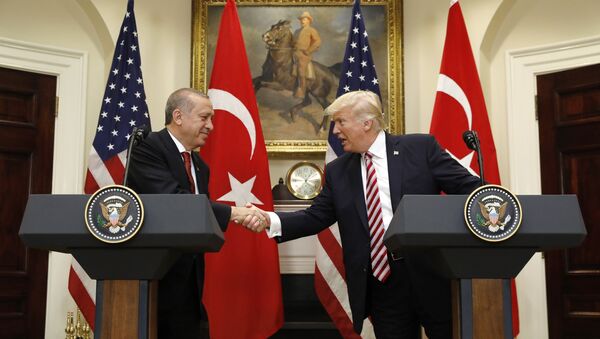According to Turkish presidential spokesman İbrahim Kalın, Ankara has been deeply disappointed by Washington’s actions, which had almost broken ties between the countries.
"Because of one pastor, the US has brought relations with a country like Turkey, to an almost complete halt. They know perfectly well our attitude towards the Kurdistan Workers’ Party (PKK) and promised to do something about it, but in reality, their approach didn't satisfy us. There is still the problem with FETO [the movement of Islamic cleric Fethullah Gulen], whose head is still in the US; he is working there, his schools are working, his activities are continuing. Our disappointment is profound," he told reporters.
READ MORE: Turkey's Erdogan: 'We Will Boycott US Electronic Products'
The pastor was detained by the authorities two years ago, as they believed that he was tied to the Islamic cleric Fethullah Gulen, who now lives in the US. Turkey repeatedly urged the US to ban the movement, which Ankara considered to be responsible for the coup attempt in 2016.
Battle Over F-35 Supplies
Kalın also announced that Ankara would turn to legal measures if the US blocks the transfer of F-35 fighter jets to the country, stressing that Turkey had fulfilled its part of the deal.
"The paragraph signed [National Defense Authorization Act for Fiscal Year 2019 signed by US President Donald Trump] is part of general law. Our pilots continue training until there is no specific decision. But breaking the contract is not so easy… We have fulfilled all the conditions, we have paid money. And if the Unites States infringe the contract, we'll advocate our interests within legal framework," Kalin told reporters.
READ MORE: Retired Turkish General: US Will Reap the Consequences If It Cancels F-35 Deal
The act, proposed by Senator John McCain, and signed into law by Trump on Monday, stipulates barring the transfer of F-35 fighter jets to the Turkish military.
Washington has already claimed that Turkey's purchase of Russian S-400 anti-missile systems could result in the withholding of the F-35 jets, as the US Congress was concerned Moscow could use the agreement in order to research the F-35 and access sensitive data regarding NATO technologies.



